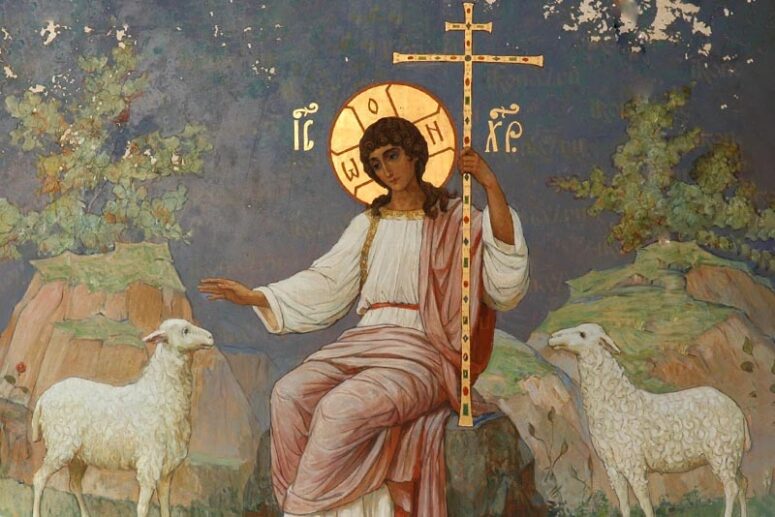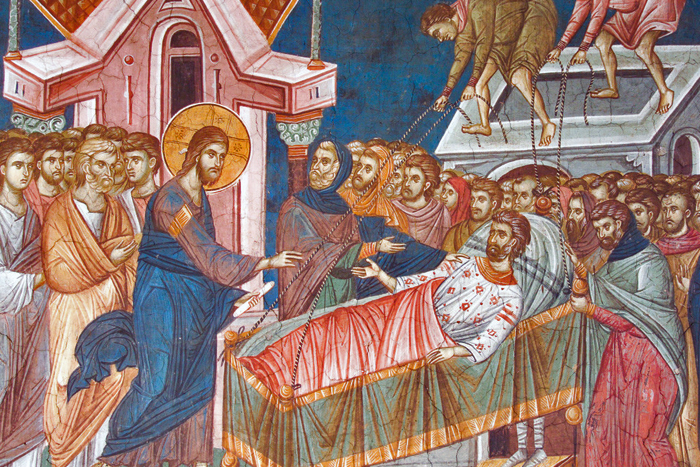
In his Gospel, Christ returns multiple times to the theme of a shepherd and the sheep. In one of His parables, He draws this impressive parallel: Most assuredly, I say to you, he who does not enter the sheepfold by the door, but climbs up some other way, the same is a thief and a robber. But he who enters by the door is the shepherd of the sheep. o him the doorkeeper opens, and the sheep hear his voice; and he calls his sheep by name and leads them out. And when he brings out his own sheep, he goes before them; and the sheep follow him, for they know his voice. (John 10:1–4).
His disciples do not comprehend the the parable at first, so He repeats: “I am the door. If anyone enters by Me, he will be saved and will go in and out and find pasture.” (John 10:-9).
In the allegory of the shepherd and the sheep, why does Christ call himself the door? And why does He underline that people would go in and go out by it?
The sheep herding customs of Ancient Judea have some answers.
Because of its rocky soil, sheep herding in Judea was far more common than crop farming. A shepherd’s work was physically demanding and enduring. They always had to be on the move in search of pastures, and never lose sight of their flock even for a moment. A shepherd guarded his sheep against predators and robbers and made sure that no sheep would stray and be harmed.
In Palestine, people mostly grew sheep for wool. There was an amazing closeness between the shepherd and the flock. For example, he called every sheep by name, and the sheep responded. Henry Morton, a British journalist who published a series of best-selling books about his travels to the Holy Land in the 1930s, made this observation about an Israeli shepherd: “Sometimes, he called the sheep in a loud chant and a strange language I had never heard spoken before…” Perhaps Christ was referring to this manner of speaking when He said: The sheep hear his voice; and he calls his sheep by name and leads them out. According to the fathers of the Church, this voice to which Christ refers in the Gospel was a tell-tale sign of the Shepherd from Heaven, setting him apart from the “thieves and robbers”, or false teachers.

Occasionally, the flock could walk far into the mountains, and rest in a sheepfold on a mountain slope. Sheepfolds were built in the open space and were sheltered only by a wall on its side with an opening through which the sheep could enter and exit. As they read the Gospel, few people today might know that the shepherd always lay down at this opening, and became like a door. No sheep could enter or leave without stepping over the shepherd. Anyone who went past the door or climbed over the fence was a thief and had evil intentions. Therefore, Christ describes Himself as the door through which one must pass to reach the Kingdom of Heaven. Bishop Luke of the Crimea interpreted Christ’s words as follows: “Remember, you, the sheep of Christ have only one way to travel, and only one door to pass, the one to the Kingdom of Heaven. And this door is nothing else than our Lord Jesus Christ. Use no other door, walk away from every other fence, live within the sheepfold of Christ, His love and His care.”
Also, Christ underlines: “Anyone enters by Me, he will be saved and will go in and out and find pasture.” By pasture, He means the blessing of the Heavenly Kingdom, which people will find by going through the door of Christ. With the words “go in and go out”, Christ alludes to a well-known saying of the Jewish people. In the Holy Scripture, it is used to speak of someone who enjoys complete freedom, peace of mind, and security. For example, the Old Testament speaks of children as those who are still incapable of going in or out. “but I am a little child; I do not know how to go out or come in” (3 Kings 3:7). To sum up, anyone who goes in through the door of Jesus finds their spiritual pasture – freedom, peace, tranquillity and security.
Tranlsated by The Catalogue of Good Deeds
Source: https://foma.ru/pochemu-hristos-sravnivaet-sebja-s-dverju-v-zagon-dlja-ovec-vot-kakoj-maloizvestnyj-fakt-za-jetim-stoit.html





Your discussion mentions that His sheep know His voice. When we hear His New Commandmen that His followers MUST love one another so that “ALL WIIL KNOW that they are His disciples, that is His Voice! (Gospel of John, chapter 13, verses 34, 35) Those who are disobeying His Voice, blowing off the arms and legs and heads of their own church sisters and brothers are nnot entering through the Door. They are trying to climb into the sheepfold another way. And the voice telling them that their sins will be washed away if they die killing Ukrainians Is not the voice of the true Shepherd.
Cordially,
Ross